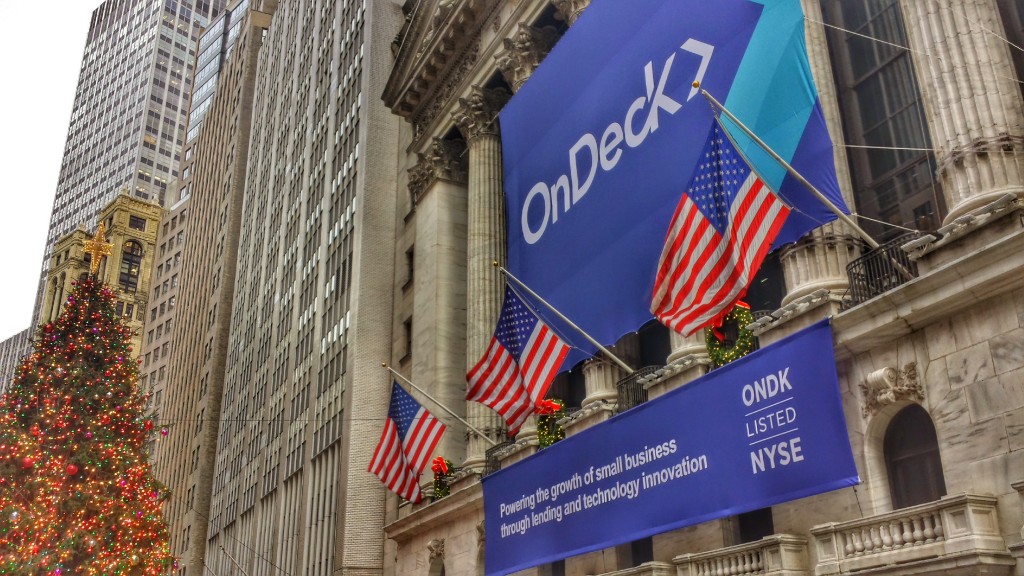OnDeck Disappoints: “Marketplace” in Jeopardy?

OnDeck finally bombed an earnings report and marketplace lending (at least their marketplace anyway) is being seriously questioned. The company is now predicting a full-year adjusted EBITDA loss of between $41 million and $49 million, down from the projection they made just three months ago of full-year positive EBITDA of $10 million to $14 million. They had a GAAP net loss in Q1 of $12.6 million.
Any positive details were disregarded by analysts who hammered away at the shifting dynamic of the OnDeck Marketplace. The premium earned on selling off loans to major investors through this channel shrank to a measly 5.7% Gain on Sale Rate during the first quarter. Bank of America’s Nat Schindler pointed out on the call that back when OnDeck was getting a 9% Gain on Sale Rate, that they believed even that number to be undervalued, but that they had said it was worth selling them at a discount to “seed the marketplace.” With the margins now compressed to a point where “seeding the marketplace” is no longer a rational excuse, he wondered why they still sold $123 million worth. “Why not just keep it all? What would happen if you just stopped the marketplace?” he asked.
Stop the marketplace
Stopping the marketplace quickly became the underlying theme of the Q&A session. Previously, 35-45% of their term loans were sold off through Marketplace but they now predict that only 15%-25% will be sold through it in 2016.
David Scharf with JMP Securities asked if and when the company could ever break even assuming there was no marketplace.
Vasu Govil with Morgan Stanley asked “if the risk premiums were to continue to rise, at what point does marketplace funding go to zero? At what point do you decide that it’s not worth doing it and that you want to keep all the risk on the balance sheet?”
OnDeck CFO Howard Katzenberg explained the decreasing margins as a retreat from one type of buyer. “Our marketplace buyers fall into two counts,” he said. “The first is those that buy and want to hold ’til maturity and the other segment buys with the plan on securitizing the loans and selling off the residual position of the portfolio. Given the inherent leverage in the securitization transactions, those buyers historically have been willing to pay higher premiums versus the kind of the more traditional hold ’til maturity investors.”
The appetite from those that plan to securitize the loans has dropped off, the ones that are typically willing to pay more.
Losses today instead of income
OnDeck did book more loans on their balance sheet than they had expected and as a result GAAP rules require them to book a provision expense for them. “So as our loan book grows, we will have a mismatch of the provision expense upfront versus earning interest income over the lifetime of the loan,” Katzenberg said. “Moreover, when we sell a loan through marketplace, we book a gain on sale upfront, which had the affect of accelerating the recognition of income.”
Translation: Booking a loan on balance sheet means recording a loss today while selling a loan through marketplace means booking income today. The first might be more profitable over time but transitioning from marketplace to balance sheet makes the books look worse in the short term.
Originations down
Actual originations grew by 37% year-over-year, missing the 40-50% range projected. OnDeck CEO Noah Breslow was unapologetic about that. “We’re not going to do anything unnatural because of those growth numbers,” he argued. “If we conclude that growing at a slower rate is best for our business then we will grow slower.”
The stock was down 3.82% on the day prior to the earnings release but plunged by nearly 30% in after hours trading.
Last modified: May 3, 2016Sean Murray is the President and Chief Editor of deBanked and the founder of the Broker Fair Conference. Connect with me on LinkedIn or follow me on twitter. You can view all future deBanked events here.































